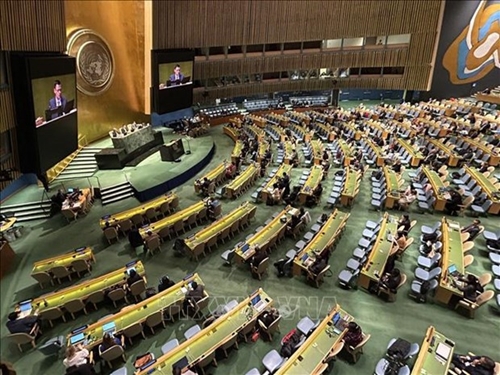Vietnam’s engagement in U.N. resolution that urges the International Court of Justice (ICJ) to outline nations' legal obligations related to curbing climate change disasters and their impacts on vulnerable communities proves the country’s point of view, the ambassador said in a recent interview to the Vietnam News Agency right after the resolution was adopted on March 29.
    |
 |
|
A meeting session of U.N. General Assembly |
The resolution, co-sponsored by 132 countries, calls on the ICJ to lay out nations' obligations for protecting Earth's climate, and the legal consequences they face if they don't. The court's opinion would be non-binding.
Giang described the adoption of the resolution as particularly significant.
First, it shows the enormous consequences of climate change and the urgency to strengthen climate change response.
Second, the urgency has become so great that it has attracted widespread international attention.
Third, the adoption of the resolution by consensus shows the advantages of the multilateral approach, upholding international law, and attaching importance to consultation and dialogue between countries.
The adoption of the resolution shows that the international community can and is more willing to take strong actions together to respond to climate change, Giang said.
Vietnam has been actively involved in promoting Vanuatu’s initiative on the resolution from the early stages, Giang said, adding that Vietnam is one of the first five members of the core group.
Vietnam actively participated in developing the draft resolution by attending nearly 50 meetings of the group from September 2022, as well as in three rounds of formal consultations with all U.N. member states and many other informal contacts, Giang said, adding many of Vietnam’s opinions were included in the resolution.
As Vietnam is considered one of the countries most severely affected by climate change, especially by sea level rise, its active participation in the core group to develop the resolution helps highlight Vietnam's active policies and efforts on climate change response, including its commitment to reduce net emissions to zero by 2050.
The participation also affirms Vietnam's active role in international mechanisms and forums on climate change, together with other countries to strengthen international cooperation on this issue, thus calling on more international support for the country in climate change responses.
In the longer term, the ICJ's advisory opinion is likely to help countries, particularly developing countries like Vietnam have stronger measures and resources for climate change responses.
Source: VNA